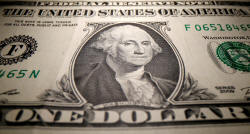Dollar steadies amid pandemic concerns, inflation in focus
 Send a link to a friend
Send a link to a friend
 [July 12, 2021] By
Julien Ponthus [July 12, 2021] By
Julien Ponthus
LONDON (Reuters) - The safe haven dollar
ticked up against most currencies on Monday as concerns about the
pandemic made investors cautious, while they also awaited more clues
about the global economic recovery before making their next moves.
With markets hyper-sensitive to any talk of early tapering, U.S.
inflation data on Tuesday will be closely watched ahead of testimony by
Federal Reserve Chair Jerome Powell on Wednesday and Thursday.
Meanwhile, the People's Bank of China's surprise policy easing on
Friday, meant to boost the post-COVID economic recovery, failed to
provide lasting momentum.
"While welcome, the move also signals that the authorities are concerned
about China’s growth prospects, so it's mixed news," said Marshall
Gittler, head of investment research at BDSwiss Holding.
The yuan was just slightly lower at 6.4750 per dollar after Chinese
shares and bonds rose. [CNY/][.SS]

Economists polled by Reuters expect U.S. consumer prices for June to
have risen 0.4% from May, and 4.0% from a year earlier, after two
straight months of sharp gains.
Any signs that inflation could be more persistent than previously
thought could fan expectations the Fed may exit from current
pandemic-era stimulus earlier, supporting the dollar against other major
currencies.
Conversely, more benign data could lead investors to think the U.S.
central bank can afford to maintain an easy policy framework for longer,
encouraging more bets on risk assets, including risk-sensitive
currencies.
At 1108 GMT, the dollar was up 0.22% against a basket of currencies
while the euro lost 0.26% at $1.1848 against the greenback.
Sterling fell 0.36% to $1.3860 while British Prime Minister Boris
Johnson is expected to confirm plans to remove nearly all remaining
COVID-19 restrictions in England from July 19, despite a surge of cases
to levels unseen for months.
[to top of second column] |

A U.S. dollar banknote is seen in this illustration taken May 26,
2020. REUTERS/Dado Ruvic/Illustration

"In the UK there is optimism about the strength of the rebound, that with the
further lifting of restrictions we will see additional demand emerging," said
Colin Asher, senior economist at Mizuho in London.
"There are expectations the Bank of England may be one of the major banks to
hike interest rates next year."
Although few investors expect the global economic recovery to be derailed by
fresh waves of COVID-19 infections, vulnerable currencies such as the
tourism-exposed Thai baht have taken a hit.
The baht was trading above Friday's low but has lost about 5% against the dollar
in a month, and on Monday Thailand's central bank warned the economy may miss
its projections as virus curbs hit growth. [EMRG/FRX]
Elsewhere in emerging markets, the rand sank more than 2% to a low of 14.4968 to
the dollar as violence broke out after the jailing of former South African
President Jacob Zuma, resulting in property damage and road closures.
Japan's safe-haven yen stood at 110.18 yen per dollar, off Thursday's one-month
high of 109.535.
Cryptocurrencies were on the defensives with bitcoin down about 1.5% at $33,760
and ether down 1.2% at $2,113.
(Reporting by Julien Ponthus; Editing by Ana Nicolaci da Costa and Mark
Heinrich)
[© 2021 Thomson Reuters. All rights
reserved.] Copyright 2021 Reuters. All rights reserved. This material may not be published,
broadcast, rewritten or redistributed.
Thompson Reuters is solely responsible for this content.
 |